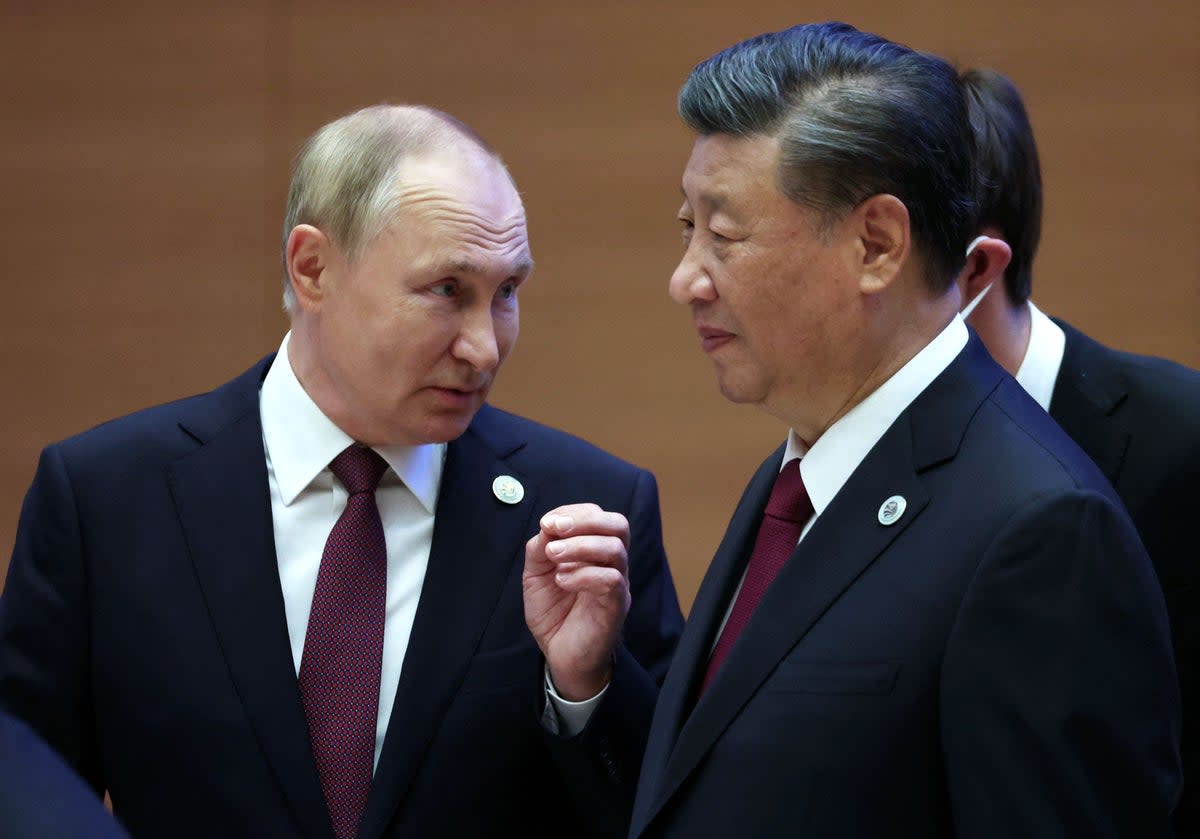Xi Jinping to visit Moscow likely around anniversary of Ukraine invasion

Chinese president Xi Jinping is likely to visit Russia on invitation from Vladimir Putin around the one-year anniversary of Moscow’s invasion of Ukraine, the Russian foreign ministry said on Monday.
“This year, Russia and China will join efforts to enhance and promote further bilateral relations between the two governments. As you know, Russian president Vladimir Putin has invited Chinese leader Xi Jinping on an official visit this spring,” the Russian foreign ministry said, according to a report by Russia’s state news agency TASS.
It added that the Kremlin will “proceed from the understanding that this will be the central event in the bilateral agenda for 2023”.
While Russia’s foreign affairs ministry has not cited a date for the anticipated visit by Moscow’s ally, the invasion of Ukraine launched by Mr Putin will mark a year on 24 February.
Officials in Beijing have not confirmed the Russian ministry’s remarks.
This will mark Mr Xi’s first visit to Russia since the all-out war on Ukraine even as China has tried to maintain a delicate balance on publicly supporting Moscow’s invasion.
Mr Putin had called on his Asian ally to visit Russia in December. "We are expecting you, dear Mr Chairman, dear friend, we are expecting you next spring on a state visit to Moscow," he had told Xi in a long introductory statement broadcast on state television.
In response, China’s readout of the video summit between the two leaders said that there was a difference in approach to their developing alliance.
Beijing also dedicated any mention of a visit to the invading nation and said that the Xi Jinping administration would maintain its “objective and fair” stance.
In November, China had delivered scathing criticism over Russia’s move to invade Ukraine, including Mr Putin’s non-disclosure of his plans to invade. China had also condemned the "irresponsibility" of suggested nuclear threats ahead of the G20 summit in Indonesia.
According to a Chinese official, Mr Putin did not tell his Chinese counterpart Xi Jinping “the truth”, reported the Financial Times.
The officials said that the two leaders had hailed a “no limits” alliance between Moscow and Beijing when they met just 20 days before the Kremlin launched its invasion on Ukraine in February.
“If he had told us, we wouldn’t have been in such an awkward position,” the official had revealed in November.
Mr Xi was caught off-guard by the invasion of Ukraine, which Russia still describes as a “special military operation”, according to four people briefed on the February meeting between the two leaders.
China resents the fact that this non-disclosure from Moscow threatened the safety of thousands of Chinese nationals who were in Ukraine at the time war broke out.
However, the foreign affairs ministry has underscored “the role of trusting ties”, in the latest statement, between Mr Xi and Mr Putin on deepening their “comprehensive bilateral partnership and strategic cooperation”.
"In the past decade, the heads of state have held forty meetings. These include bilateral visits, meetings on the sidelines of multilateral forums, and other events," the ministry said.
It added that the in-person exchanges will hopefully resume as China eases the anti-Covid curbs.
"We will work hard to push relations between Russia and China to a higher level for the sake of bilateral progress and for the benefit of our peoples," the ministry said, as it hailed Beijing’s contribution as a trade ally in the past financial year.
China is credited with being Russia’s largest trade partner for more than a decade as its staunch ally.
The Asian nation, alongside India, accounts for Russia’s largest oil importer, along with being the second largest supplier of pipeline gas and fourth largest provider of liquefied natural gas.


